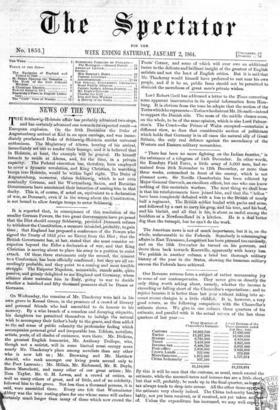On Wednesday, the remains of Mr. Thackeray were laid in
his own grave in Kensal Green, in the presence of a crowd of literary and personal friends who had assembled to do honour to his memory. By a wise breach of a senseless and decaying etiquette, his daughters too permitted themselves to indulge the natural wish to accompany their father's body to the grave, and thus added to the sad sense of public calamity the profounder feeling which accompanies -personal grief and irreparable lose. Editors, novelists, artists, poets, of all shades of eminence, were there. Mr. Dickens, the greatest English humourist, Mr. Anthony Trollope, who, though not a satirist, will in some limited sense occupy more nearly Mr. Tha.ckeray's place among novelists than any other who is now left us ; Mr. Browning and Mr. Matthew Arnold, who rank amongst our living poets second only to the Poet Laureate ; Mr. Millais, Mr. Richmond, Mr. R. Doyle, Baron Marochetti, and many other of our great artists ; Mr. Tom Taylor, Mr. G. H. Lewes, and a crowd of critics, as well as many others of great, and of little, and of no celebrity, followed him to the grave. Not less than a thousand persons, it is said, were assembled there. Every one felt that Westminster Abbey was the true resting-place for one whose name will endure ertainly much longer than many of those which now crowd the Poets' Corner, and some of which will ever owe an additional lustre to the delicate and brilliant insight of the greatest of English satirists and not the least of English critics. But it is said that Mr. Thackeray would himself have preferred to rest near his own people, and if it be so, public fame should not be permitted to diminish the sacredness of great men's private wishes.
















































 Previous page
Previous page